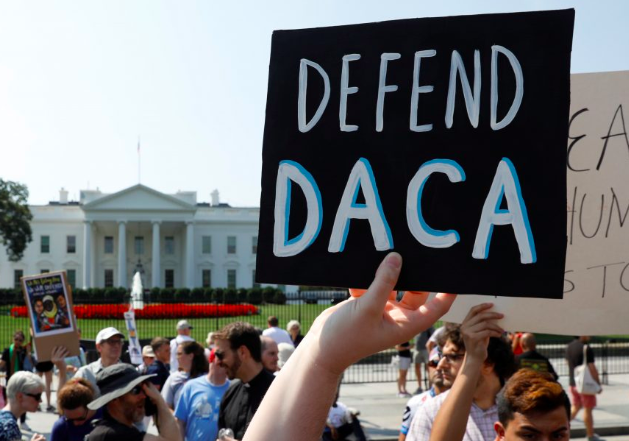In 2001, Northern Essex Community College became the first federally designated Hispanic Serving Institution (HSI) in New England. Nearly half of our students are Hispanic, mostly from the Dominican Republic and Puerto Rico.
Each year, some of our students are also undocumented immigrants, participants in the Deferred Action for Childhood Arrivals (DACA) program (often referred to as DREAMers), or are in the United States under Temporary Protected Status (TPS).
A year ago, in order to call attention to the challenges our immigrant students often face, and to increase public understanding of how state and national higher education and immigration policies and practices impact our students, our campuses and the communities we serve, I joined more than 400 college and university presidents across Massachusetts and around the nation in the Presidents’ Alliance on Higher Education and Immigration.
Later today, the Committee on the Judiciary in the U.S. House of Representatives is holding a hearing on Dreamers and TPS recipients, and the Presidents’ Alliance has prepared this “Statement for the Record,” outlining the need to provide relief to these students; and sharing legislative principles for what future legislation should contain:
Statement for the Record of
Nancy Cantor Co-Chair, Steering Committee
Chancellor, Rutgers University – Newark
Louis Caldera
Senior Advisor Co-Chair, Steering Committee
David W. Oxtoby Co-Chair, Steering Committee
President Emeritus, Pomona College
Miriam Feldblum Executive Director
Presidents’ Alliance on Higher Education and Immigration For a Hearing of the House Committee on the Judiciary Protecting Dreamers and TPS Recipients
Wednesday, March 6, 2019 2141 Rayburn House Office Building
PRESIDENTS’ ALLIANCE ON HIGHER EDUCATION STATEMENT FOR THE RECORD
I. INTRODUCTION
The non-partisan Presidents’ Alliance on Higher Education and Immigration (Presidents’ Alliance) brings together college and university leaders committed to increasing public understanding of how immigration policies and practices impact our students, campuses, and communities, supporting policies that create a welcoming environment for immigrant, undocumented, and international students on our campuses; and identifying and sharing best practices.1 The Presidents’ Alliance is comprised of over 420 presidents and chancellors of public and private colleges and universities, enrolling over four million students in 41 states, Washington D.C., and Puerto Rico. The Presidents’ Alliance collaborates with congressional offices to engage in higher education and immigration related advocacy, including providing technical and substantive recommendations to staff and engaging in oversight. This statement provides recommendations to ensure that future immigration relief meets the needs of immigrant youth and the higher education community; and extends appropriate protections to Dreamers (including Deferred Action for Childhood Arrivals (DACA) recipients) and Temporary Protected Status (TPS) holders.
DACA allowed approximately 800,000 undocumented youth to access more affordable higher education, work opportunities, driver’s licenses, bank accounts, professional and occupational licenses (in some states), and more. For students, alumni, staff, faculty, and their families who rely on it, the oss of DACA would be devastating to individuals as well as across campuses and across the entire country.2 DACA also represents a small subset of the larger Dreamer population, which must also be protected by Congress.
TPS, a form of humanitarian protection provided to individuals who cannot return to their home countries due to violent conflict or natural disaster, provides recipients temporary refuge in the United States, along with work authorization. The federal government currently provides TPS for over 300,000 foreign nationals.3 Many TPS recipients have been in the country for a decade or more. Some TPS holders are students on our campuses. Many are a crucial part of the workforce, including at colleges and universities, and have U.S. citizen children who are current or prospective students in our higher education system.
We urge the U.S. House of Representatives take the first steps to resolve what is still an urgent matter: permanently protecting Dreamers and TPS recipients. The high anxiety and uncertainty on our campuses continues as many of our Dreamer students, alumni, and community members, along with those with TPS, fear for their futures and families. Legislation that includes permanent protections, absent of harsh restrictions or income criteria, for Dreamers and TPS recipients would be an important achievement and a good faith start to future immigration reform discussions.
Since the rescission of DACA by the administration in September of 2017, we have been heartened by the bipartisan support expressed for DACA and Dreamers by both Democrats and Republicans in Congress, even as it has fallen short of the goal of enacting legislation that protects immigrant youth and young adults from deportation and puts them on a roadmap to citizenship. Our country’s Dreamers and TPS holders remain in limbo. Only Congress can pass legislation that is needed so that these young people–Americans in all but status–may fulfill their human potential and contribute to our campuses, communities and country.
Our campuses and communities have also benefited directly from the thousands of TPS recipients who are our valued colleagues on campuses across the country. They and their children (often U.S. citizens) are our employees, students, neighbors, and friends. They too live with great uncertainty, at risk of losing their status and work authorization and being forced to leave the United States, where many have been living, raising families, and working for decades.
For us, protecting Dreamers and TPS holders is a moral issue that goes to the heart of being a country that is just, wise, and compassionate enough to create a roadmap toward full citizenship for those who, through their long presence, have put down roots and made a life here as contributing members of our communities. We see in our classrooms and labs, among our alumni and workers, the drive, accomplishments, and potential of these individuals and are convinced that a legislative solution to their predicament is not only the right thing to do by them, but in the best interests of our country. Protecting DACA recipients and TPS holders and providing Dreamers with a roadmap to citizenship are not partisan issues. These are broadly held American priorities. In poll after poll, the majority of Americans, including majorities on a bipartisan basis, support legislation to protect DACA recipients and create a permanent pathway.
II. BACKGROUND
The most likely and imminent vehicle for immigration relief is the forthcoming Dream and Promise Act of 2019 (Dream 2019), which would establish a roadmap to citizenship for immigrant youth and young adults who are commonly known as Dreamers and to TPS holders. The former category contains many individuals who currently hold or held DACA. Upon introduction, Dream 2019 will represent the 116t h Congress’ inaugural effort to provide relief to these populations.
The Presidents’ Alliance exists at the intersection of immigration and higher education. The college and university presidents that make up the Presidents’ Alliance have a unique perspective on the higher education provisions on any immigration legislation providing relief to Dreamers and TPS holders. With that in mind, the Presidents’ Alliance shares some of the key higher education principles we encourage Congress to adopt in any future legislative effort.
Historically, Dream Act-related legislation touched upon higher education related issues in two key ways: (a) repealing Section 505 of IIRIRA, which establishes barriers for states seeking to offer in-state tuition to undocumented students; and (b) extending eligibility for federal financial aid programs to undocumented students. The new Congress has an opportunity to reframe the debate in regard to higher education and incorporate new, inclusive, and educationally appropriate provisions that would establish Dream 2019 as the benchmark for higher education access for Dreamers and TPS holders.
A. STATE AND LOCAL EDUCATION EQUITY
Equity in Admissions, Enrollment, and Tuition. Currently, immigrant students face a vastly inconsistent patchwork of state tuition access laws. A minority of states have enacted policies that bar undocumented students from applying for admission, enrolling, or being eligible for in-state tuition.4 Access to higher education, especially for first generation immigrant students, is critical for long-term success and should be contingent on students’ merits—not their immigration status. Congress should incorporate a flexible provision that would enable public institutions to allow undocumented students who otherwise meet a state’s residency requirements to apply for admission, enroll, and receive in-state tuition.
American Dream Grants. Federal funding is often used to encourage states and educational institutions to engage in conduct that would expand access to education. Federal funding is not currently tied to the availability of in-state tuition and financial aid for immigrant students, with many states: (a) failing to enact policies that would expand access; or (b) enacting policies that would explicitly bar students from these educational benefits. To encourage states to offer in-state tuition and financial aid to undocumented immigrant students, we recommend that Dream 2019 establish a grant program conditioned on states expanding access to in-state tuition and financial aid to immigrant students, similar to previous versions of the Higher Education Affordability Act.5
B. FEDERAL EDUCATION EQUITY
Access to Federal Financial Aid. For first generation students, especially immigrant youth and adult learners, lack of funding can represent one of the largest obstacles to obtaining a higher education. Yet, under federal law, undocumented students are ineligible for all forms of federal financial aid, including grants, loans, services, work-study, access to work force programs, and other educational and financial support programs.6 Previous versions of the Dream Act provided varying levels of access to federal financial aid, but often excluded access to federal Pell grants. We recommend that Dream 2019 ensure that applicants who receive conditional permanent resident status are eligible for all forms of federal financial aid, including grants, loans, services, work-study, access to work force programs, and other educational and financial support programs.
Restoration of State Option for In-State Tuition. As previously mentioned, federal law, specifically Section 505 of IIRIRA 7, establishes certain barriers to discourage states from offering in-state tuition based on residency. While some states have been able to offer in-state tuition regardless, the continued existence of this provision limits the flexibility of states in this area. We recommend that Dream 2019 follow the path of previous Dream Acts and retroactively repeal Section 505 (e.g. enact a repeal as if that repeal had taken effect when the law was initially passed).
Expand Access to ROTC Scholarships, Military Commissioning Programs, and Service Academies. ROTC scholarships, military commissioning programs, and service academies provide vitally important ways for young people to serve our country while pursuing their education. The five service academies operated by different branches of the Armed Forces serve as higher education institutions that fully fund a student’s education. Noncitizens, including conditional and lawful permanent residents, are ineligible for these academies, ROTC scholarships and military commissioning programs (with few exceptions) under federal law. Yet, studies show that many of these immigrant students who are “citizens in waiting” have skills and training sought by the military, including expertise in languages, STEM fields, and the health sciences. We recommend that Dream 2019 expand access to ROTC scholarships, military commissioning programs, and service academies for immigrant youth and young adults with lawful or conditional permanent resident status, DACA and TPS.
C. ACCESS AND EXPANSION OF RELIEF
Provide Relief Regardless of Immigration Status to Deported Youth. Legislation providing relief to immigrant youth has sometimes required that, to qualify for relief, an applicant must lack or have entered without legal status. This requirement unfairly and disproportionately negatively affects immigrant youth who have resided in the United States for extended periods of time under other forms of immigration status (e.g. TPS, Deferred Enforcement Departure, dependent visas, etc.) and consider themselves Dreamers. Moreover, many individuals who would qualify for relief were deported under this administration’s harsh enforcement policies and the bill should provide relief for this population. We recommend that Dream 2019 not require applicants to lack or have entered the country without legal status to be eligible for relief. Additionally, we also recommend that Dream 2019 provide relief to immigrant youth and young adults who were previously deported and otherwise meet all of the bill’s provisions but for the physical presence and continuous residence requirements.
Expand Criteria for Stay of Removals. Previous versions of the Dream Act provided stays of removal for immigrant youth who did not yet graduate from high school, thus allowing applicants to remain in the country while they worked toward meeting the initial threshold requirement for relief. These stays of removal, however, required regular attendance in school, and did not apply to students that, due to family issues, mental health issues, homelessness, economic issues, or other exigent circumstances temporarily unenrolled from school. We recommend that Dream 2019 expand stays of removal by not requiring immigrant youth to be enrolled in school to qualify for a stay of removal.
Establish of Grant Program for NGOs. Providing relief to upwards of three million immigrant youth and young adults, which include many students and adult learners in the post-secondary educational system, represents an enormous undertaking that will require the collaboration of legal service providers, educational institutions, and community groups. Funding to provide legal representation to those seeking relief, especially those with complex cases; to provide mental health services to applicants; and that can be re-granted to assist applicants in paying filing fees is essential. The Senate immigration bill in 2013 contained a similar grant program that could be used as a model.8 We recommend that Dream 2019 establish a grant program to provide funding for non-profit organizations serving immigrant youth seeking relief under the bill, including law school clinics and undocumented student resource centers connected to universities and colleges; these grants should fund legal representation, mental health access, and assist applicants in paying filing fees.
D. COLLATERAL AND RELATED BENEFITS
Expand Access to Professional Licenses. Under federal law, the federal government cannot issue non-qualified immigrants professional, commercial, or business licenses; and, unless a state passes an affirmative law or policy, neither can the state. Almost 25 percent of all workers need an employment license for their job, ranging from nail salon technicians to attorneys.9 A recent survey by TheDream.US revealed that 66 percent of DACA and TPS scholars planned on entering a profession that requires a license.10 Access to licenses are particularly important for students attending higher education institutions and studying in an educational field that will require subsequent licensing. Importantly, access to licenses are critical for immigrant youth to earn the economic resources to support themselves and their families so they can afford to apply for conditional permanent resident status. We recommend that Dream 2019 update federal law so that individuals with an employment authorization document cannot be denied a license based on their immigration status.
Restore Advance Parole for DACA. Advance parole allows DACA recipients to leave and return to the United States for educational, employment, and humanitarian reasons. Unfortunately, with the rescission of DACA, the ability of DACA recipients to travel with advance parole was curtailed; with the subsequent injunction failed to restore advance parole. Travel with advance parole is valuable for students required to travel abroad for their educational degree, attend study abroad classes, and who need to travel for employment purposes (and to continue to fund their higher education). We recommend that Dream 2019 restore the ability of DACA recipients to apply for advance parole during the period before they obtain conditional permanent resident status.
III. CONCLUSION
Immigrant students across the nation face many obstacles and lack of consistency in terms of access to higher education, in-state tuition, and financial aid. Immigrant students, who have attended and graduated from high schools in the United States, are integral members of our communities deserving of dignity, respect, and the opportunity to realize their full human potential. Immigrant students able to pursue their academic and professional dreams can far better contribute, socially and economically, to our communities and nation. Uniform access to higher education is essential to ensure that these students will help meet the challenges that lie before us, just as generations of immigrants have done before them.
Legislation providing relief to Dreamers and TPS recipients should prioritize the establishment of a roadmap to citizenship. We recommend that this priority be complemented with legislative provisions that help ensure immigrant student access and equity in higher education. Congress can provide the vital foundation for the educational, professional, and economic future of those who obtain this relief. The principles enumerated in this statement would accomplish this goal. With Congress providing permanent protection and relief to Dreamers and TPS holders, we can fully welcome these aspiring Americans into the fabric of our nation and continue to benefit from their contributions, hard work, and talent for generations to come.
1 Founding Statement, Presidents’ Alliance on Higher Education and Immigration (last accessed March 3, 2019), https://www.presidentsimmigrationalliance.org/about/statement/.
2 Tom K. Wong et al., Amid Legal and Political Uncertainty, DACA Remains More Important Than Ever, Center for American Progress, Aug. 15, 2018, https://www.americanprogress.org/issues/immigration/news/2018/08/15/454731/amid-legal-political-uncertaint y-daca-remains-important-ever/.
3 Zuzana Cepla, Fact Sheet: Temporary Protected Status, National Immigration Forum, March 1, 2019, https://immigrationforum.org/article/fact-sheet-temporary-protected-status/.
4 Approximately ten states enacted legislation or provisions that bar undocumented students from applying for admission, enrolling, or being eligible for in-state tuition; while 23 states have no explicit state legislation (though in some states, the Board of Regents or system governing Boards, or individual institutions have enacted more inclusive policies, or the state’s Attorney General have determined that DACA recipients, who meet the state’s residency requirements, are eligible for enrollment or in-state tuition). Eighteen states enacted inclusive legislation granting undocumented students who meet a state’s residency requirement to access in-state tuition. Policy Environment, University Leaders for Educational Access and Diversity (last accessed March 1, 2019), https://uleadnet.org.
5 Higher Education Affordability Act, S.2954§415 113th Cong. (2014).
6 Congress should explore the possibility of also expanding collateral federal benefits, including funding to support financial literacy, tax filing, loan counseling, and similar services.
7 8 U.S.C. § 1623 (West 2019).
8 Border Security, Economic Opportunity, and Immigration Modernization Act. S. 744 § 2106 113th Cong. (2013).
9 Ryan Nunn, Occupational licensing and American Workers, Brookings, June 21, 2016, https://www.brookings.edu/research/occupational-licensing-and-the-american-worker/.
10 In Their Own Words – Higher Education, DACA, and TPS 8, TheDream. US, Oct. 2018, available at https://www.thedream.us/wp-content/uploads/2018/10/TheDream.US-In-Their-Own-Words-Report-Oct-2018-1-2 .pdf.







